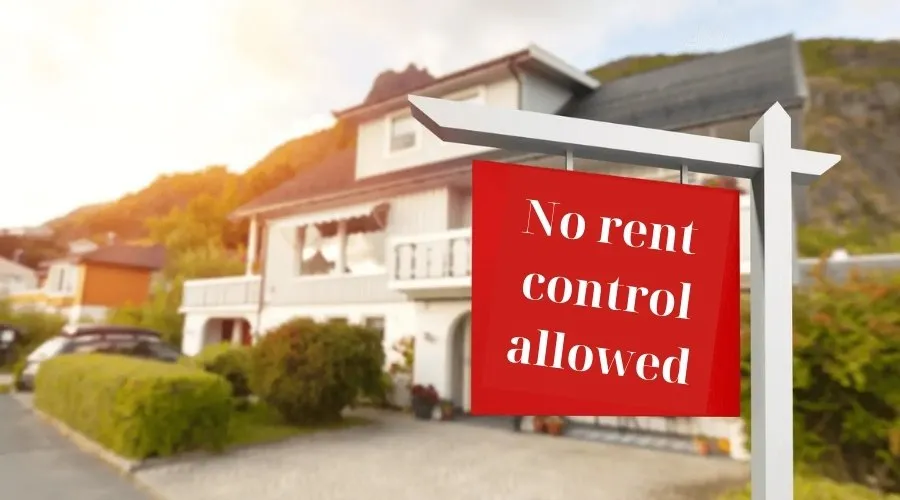Understanding Massachusetts rent control laws is crucial for both tenants and landlords. At LeaseRunner, we provide clear guidance on tenant rights, eviction rules, and rent increases so you can navigate housing laws with confidence. This article breaks down the essentials and highlights what may change if rent control returns in the future.
Overview of Massachusetts Rent Control Laws (as of 2025)
Massachusetts does not have state-wide laws establishing rent control, and local governments are prohibited from creating their own rent control ordinances. Since the 1994 ban, rental prices have been left to market forces, making Massachusetts one of the most expensive housing markets in the U.S.
For tenants, this means there are no fixed rent increase limits. However, landlords must still comply with tenant rights and protections under fair housing statutes and provide habitable living conditions.
Even without formal rent stabilization laws in Massachusetts, landlords must follow notice requirements and other landlord regulations when raising rent. These requirements form part of the broader legal framework for rent control and ensure a balance between flexibility for property owners and basic landlord-tenant laws.
Efforts to reinstate rent control have been debated for years, but no comprehensive rent control overview has been codified into law at the statewide level. For state-specific updates, see Massachusetts housing laws.
Rent Increase Requirements for Massachusetts Landlords
Understanding how rent increase policies in Massachusetts work is critical for both landlords and tenants. These rules set legal rent increase guidelines that ensure fairness, transparency, and compliance.
Notice requirements for rent increases
Massachusetts rent control laws require landlords to provide written notice before raising the rent. These rules protect tenants by giving them enough time to decide whether to accept the new terms or move out. Chapter 186 of the General Laws governs these requirements, and failure to follow them can invalidate the increase.
- Minimum notice period: Landlords must give at least 30 days’ notice for month-to-month tenants, or one full rental period if rent is paid less frequently (such as quarterly). For fixed-term leases, rent cannot be raised mid-term, but changes can be proposed at renewal—usually with 30 days’ notice before the lease ends. See also how much an eviction notice costs.
- What the notice must include: A valid notice must state the current rent, the new proposed rent, the effective date, and confirmation that the tenancy continues under the new terms unless the tenant objects or vacates. Helpful guides on types of eviction notices explain required details.
- Delivery methods: Written notice should be delivered by certified mail or in person with proof of receipt. An electronic notice, such as email, is only valid if the lease agreement allows it. Many landlords adapt formats from a 30-day notice to vacate.
- Special cases: Public or subsidized housing may require 60 days’ notice, and some exempt properties from rent control (like newly built units or small owner-occupied homes) have different obligations.
Breaking these rules can have serious consequences. Housing courts, the Attorney General’s Office, and the Massachusetts Commission Against Discrimination (MCAD) enforce violations. Tenants facing unfair rent increases may also use tools like an eviction check to understand their legal standing.

Consequences of breaking the law
Breaking the rent control specifics rules in Massachusetts can have serious consequences for landlords. Housing courts, the Attorney General’s Office, and the Massachusetts Commission Against Discrimination (MCAD) handle enforcement.
- Retaliatory increases: It is illegal to raise rent in response to tenant actions such as reporting code violations. Courts may award tenants triple damages (up to three months’ rent), attorney fees, and injunctions to stop the increase.
- Discriminatory increases: Under state and federal fair housing laws, landlords cannot raise rent based on protected classes such as family status, disability, or source of income (including Section 8 vouchers). Violations can result in fines of $10,000 or more, compensatory damages, and required fair housing training.
- Recent enforcement examples:
- In a 2020 South Shore case, landlords increased rent after Section 8 inquiries. This resulted in $100,000 in penalties and required training.
- In 2022, the Attorney General’s office handled cases of unfair rent increases. This led to $50,000 in restitution and fines.
- In 2024–2025, ongoing MCAD complaints show a rise in source-of-income discrimination. Settlements range from $20,000 to $35,000.
Tenants should keep written records. They can also get help from legal aid services like Greater Boston Legal Services or MassLegalHelp. Landlords who break the law often face fines, damage to their reputation, and possible loss of rental licenses.
Eviction Protections for Massachusetts Tenants
Evictions must follow due process. Tenants can raise defenses such as improper notice, discrimination, or habitability issues. Rent increase dispute resolution often overlaps with landlord-tenant dispute resolution and may involve legal mediation services. More details can be found in the Massachusetts eviction process.
State-wide tenant rights
Massachusetts has strong tenant protections. This ensures landlords cannot skip the legal eviction process. Here are the basic rights tenants need to know:
- Due process required: Landlords must follow the court eviction process, and tenants can raise defenses such as improper notice, discrimination, or habitability issues.
- Fair housing protections: Discrimination is illegal under federal and Massachusetts laws, covering race, religion, disability, source of income (like Section 8 vouchers), and other protected classes.
- Severe penalties for violations: Landlords face fines up to $16,000 per violation, plus compensatory damages.
- Anti-retaliation laws: Under M.G.L. c. 186, §18, retaliation (e.g., rent hikes or eviction after tenants report violations) is prohibited, with courts able to award triple damages.
- Right to habitable housing: The State Sanitary Code (105 CMR 410) says landlords must keep homes safe and livable. This includes providing heat, water, electricity, and pest control.
- Tenant remedies: If landlords don’t comply, tenants can withhold rent (with notice and escrow) or sue for repairs and damages.
Landlords should know about Massachusetts squatter rights in extreme cases of unlawful occupation.
Local tenant protections in the city of Cambridge
Massachusetts laws stop local rent control, but Cambridge has its own protections and resources for renters. Here’s what tenants can expect in the city:
- No rent control allowed: Although Massachusetts rent control laws ban local rent control, Cambridge provides additional tenant-focused resources.
- Mandatory rights notification: Landlords must provide tenants with written information on eviction processes and anti-discrimination protections under the Tenant Rights and Resources Notification Ordinance.
- Free tenant support: Resources include the Cambridge Multi-Service Center (housing counseling and eviction prevention) and HomeStart (rental assistance and advocacy).
- Mediation emphasis: Local programs focus on settling disputes before going to court. They promote mediation and community support.
- Discrimination complaints: Tenants may file cases with the Cambridge Human Rights Commission, which enforces protections in line with state and federal standards.

Best Practices for Renters to Negotiate Rent Increases
Massachusetts does not have rent increase limits. However, tenants can prepare and strategize to resist them. Negotiation is most effective when you understand the market. Document your communications and highlight your reliability as a renter.
Verify whether the rent increase is reasonable
Apartments.com, or local rental reports. See if the proposed increase matches average trends. For instance, Boston rents rose 5–7% in 2025. Factor in inflation, housing supply, and whether the jump goes beyond normal market shifts. Long-term tenants, especially, can argue against disproportionate increases.
Evaluate landlords’ property improvement
Landlords may justify rent hikes with renovations or energy-efficient upgrades. Ask for proof of costs and benefits. If upgrades are small or leaks aren't fixed, you can use the Massachusetts Sanitary Code. It helps you negotiate for repairs or a smaller increase.

Propose alternatives
Counter with smaller, more realistic increases, such as 3% instead of 10%, or suggest a longer lease in exchange for stability. Non-cash options—like handling minor upkeep—can also be bargaining chips. Joining with neighbors to negotiate as a group may strengthen your position.
Next steps if negotiation fails
If discussions stall, try free mediation through community centers or housing courts. Legal aid groups like Greater Boston Legal Services can help tenants challenge unfair rent increases. If nothing else works, Massachusetts law lets month-to-month tenants move with 30 days' notice.
Practical Tips for Landlords to Resolve Tenant Disputes
Disputes happen in rental housing. Massachusetts landlords can ease stress by being proactive and informed. Clear agreements, mediation, and legal help can prevent costly errors with Massachusetts rent control laws.
1. Craft a clear lease agreement with tenants
Make sure your rental contract clearly explains rent terms, maintenance duties, and how disputes will be handled. Include written notice requirements and addenda for special rules like pets or parking. Using state-approved lease templates (such as those from Mass.gov) ensures compliance with Massachusetts housing regulations.
2. Use mediation services
Massachusetts Community Mediation Centers and housing court mediators provide free or low-cost support. They can help with unpaid rent and repair requests. Neutral facilitators help both sides reach a fair solution. This often saves time and money compared to going to court.
3. Join a landlord association in Massachusetts
Groups such as the Massachusetts Rental Housing Association (MRHA) or MassLandlords provide education, legal updates, and networking. Membership also gives access to sample forms, seminars, and advocacy on statewide housing issues.
4. Seek advice from Local Housing Authorities
Organizations like the Boston Housing Authority help landlords navigate rules for subsidized housing, fair housing compliance, and tenant support programs. They can also refer you to mediation or legal resources when disputes arise.

5. Consult with a landlord-tenant attorney
If disputes get worse, talk to a landlord-tenant attorney. You can reach out through the Volunteer Lawyers Project or a private firm. Lawyers can help you by reviewing notices, representing you in housing court, and protecting you from retaliation claims. This makes sure your rental business follows Massachusetts rent control laws and other state rules.
Legislative Proposals in Massachusetts Rent Control Laws
Lawmakers are revisiting rent regulation, with new bills and a statewide initiative aiming to cap rent hikes and expand tenant protections.
- Rising housing costs have renewed debates on rent regulation in Massachusetts.
- Allow local rent stabilization programs
- Cap rent hikes at CPI + up to 5%, with an extra 2% for operating costs
- Add just-cause eviction protections
- 2026 Statewide Ballot Initiative:
- Certified by Attorney General Andrea Campbell (Sept 2025)
- Would limit rent increases to 5% annually
- Exemptions:
- Owner-occupied buildings with ≤4 units
- New construction (first 15 years)
- Backed by Homes for All Massachusetts
- Needs 75,000 more signatures by Dec 2025 to qualify for Nov 2026 ballot
- Supporters: Stress affordability amid housing crisis
- Opponents: Real estate groups warn stricter limits may deter investment
- Broader Context: Proposals connect to the Affordable Homes Act, signaling major potential shifts in Massachusetts housing policy.
Conclusion
Massachusetts rent control laws remain a central topic in the state’s housing debate. Rising rental costs put pressure on tenants and landlords. Though traditional rent control is gone, they seek fair solutions. Tenant protections, due process, and housing stability measures are key.
Future laws, like the 2026 ballot initiative, could change the legal landscape for stability. Meanwhile, renters and property owners should use informed negotiation, mediation services, and legal resources to handle disputes effectively. For more insights and updates on landlord-tenant laws, visit LeaseRunner.
FAQs
Can a landlord evict me without a reason in Massachusetts?
For tenants-at-will, landlords can end your tenancy with at least 30 days’ notice. However, they cannot evict you for discriminatory or retaliatory reasons. If you have a fixed-term lease, the landlord generally needs a valid cause—such as nonpayment of rent—or must wait until the lease term ends.
What if my apartment is not safe or habitable?
Massachusetts law gives tenants strong protections. If your rental unit is unsafe or fails to meet basic health standards, you can notify your landlord and the local health board. If repairs aren’t made, you may legally withhold rent, request a court order for repairs, or even seek damages.
How much notice is required for rent increases?
For month-to-month rentals, landlords must give at least 30 days’ written notice before raising rent. During a fixed-term lease, the landlord cannot increase rent unless your lease specifically allows it.
Is rent control returning in Massachusetts?
Currently, statewide rent control is not in effect. However, proposals to bring back rent control could appear on the 2026 ballot or through pending bills. Tenants and landlords should keep an eye on legislative updates, as rent stabilization measures may resurface in the near future.



